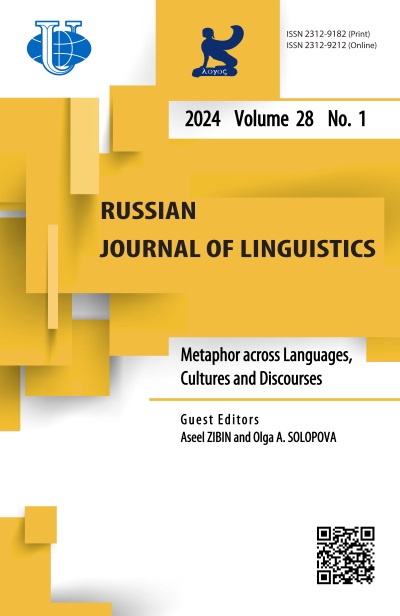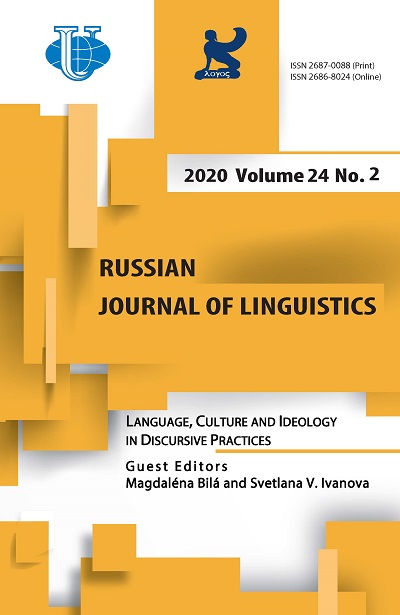God and emotions: Experience of emotive analysis
- Authors: Pashkov S.M.1
-
Affiliations:
- Herzen State Pedagogical University (Volkhov branch)
- Issue: Vol 24, No 2 (2020): Language, culture and ideology in discursive practices
- Pages: 449-466
- Section: Articles
- URL: https://journals.rudn.ru/linguistics/article/view/24101
- DOI: https://doi.org/10.22363/2687-0088-2020-24-2-449-466
Cite item
Full Text
Abstract
The present paper accentuates the importance of holistic views of the world that is relevant for text studies. The purpose of the study is to establish what language means representing emotions which are attributed to God by biblical characters are utilized, and, subsequently provide their classification. Based on the study of the theological interpretation of the antinomy ‘“the immutability of God” - the emotions of God”, the paper 1) introduces the concept of ‘attribution of emotions’ into the conceptual and terminological apparatus of emotiology thus explicating the specificity of biblical emotive meanings; 2) provides the analysis of the depicted biblical space in the emotive aspect; 3) gives the interpretation of biblical characters’ activity as a cause of emotions attributed to God. Central to the text analysis is the notion of the emotional script. This notion is instrumental in presenting the systemic description of emotion development, i.e. the cause of its origin and the corresponding reaction. The language material of the present study is taken from King James Bible. The methods employed in the study include the definitional, contextual, emotive, and lingua-stylistic analyses with references to the historical and cultural context. The outcomes of the present study include the identification of the lexical means of emotions and the following typology of such lexical units: 1) lexemes denoting the cause of emotions attributed to God; 2) lexemes denoting the emotions attributed to God; and 3) lexemes denoting the biblical space perceived by characters as a ‘reaction’ to emotions attributed to God. Given the theandric nature of Jesus Christ, the depicted emotions of His are treated as manifestations of His human nature. The results obtained have made it possible to fill in linguistic content into one of the antinomies of Christian understanding of God and to outline the prospect of further linguistic research on Christian dogmata from the perspective of emotivity.
About the authors
Sergey M. Pashkov
Herzen State Pedagogical University (Volkhov branch)
Author for correspondence.
Email: vlingua2010@mail.ru
PhD, Associate Professor, Department of Humanities, Education and Educational Technologies
Volkhov, RussiaReferences
- Аверинцев С.С. Собрание сочинений / под ред. Н.П. Аверинцевой, К.Б. Сигова. СофияЛогос. Словарь. Киïв: Дух i лiра, 2006. 902 с. [Аverintsev, Sergey S. 2006. Sobranie sochinenii (Collection of works). Kiev: Dukh i litera. (In Russ.)]
- Бахтин М.М. Эстетика словесного творчества. М.: Искусство, 1986. 445 с. [Bakhtin, Mikhail M. 1986. Estetika slovesnogo tvorchestva (The Aesthetics of Verbal Art). Moscow: Iskusstvo. (In Russ.)]
- Бобырева Е.В. Когнитивно-эмоциональное пространство религиозной коммуникации // Вестник Тюменского государственного университета. Гуманитарные исследования. Humanitates Т. 1, № 2 (2). 2015. С. 51-59. [Bobyreva, Ekaterina V. 2015. Kognitivno-emotsional'noe prostranstvo religioznoi kommunikatsii (Cognitive-emotional space of religious communication) Vestnik Tyumenskogo gosudarstvennogo universiteta. Gumanitarnye issledovaniya 1. 2 (2). 51-59. (In Russ.)]
- Волкова Я.А, Панченко Н.Н. Дискурсивная вариативность концептов деструктивных эмоций // Вестник РУДН. Серия: Лингвистика. 2018. Т. 22. № 1. С. 175-194. [Volkova, Yana A. & Nadezhda N. Panchenko. 2018. Discourse variation of the concepts of destructive emotions. Russian Journal of Linguistics 22 (1). 175-194. (In Russ.)]. doi: 10.22363/2312-9182-2018-22-1-175-194
- Гальперин И.Р. Текст как объект лингвистического исследования. М.: КомКнига, 2007. 144 с. [Gal'perin, Ilia R. 2007.Tekst kak ob"ekt lingvisticheskogo issledovaniya (Text as an object of linguistic research). Moscow: KomKniga. (In Russ.)]
- Дамаскин И. Источник знания. М.: Индрик, 2002. 416 с. [Damaskin, Ioann. 2002. Istochnik znaniya (The Source of knowledge). Moscow: Indrik. (In Russ.)]
- Ильин Е.П. Эмоции и чувства. СПб.: Питер, 2001. 752 с. [Il'in, Evgeniy P. 2001. Emotsii i chuvstva (Emotions and feelings). Saint Petersburg: Piter. (In Russ.)]
- Ильин И.А. Аксиомы религиозного опыта. М.: ООО «Издательство ACT», 2002. 586 с. [Il'in, Ivan A. 2002. Aksiomy religioznogo opyta (Axioms of Religious Experience). Moscow: OOO «Izdatel'stvo ACT». (In Russ.)]
- Карасик В.И. Языковой круг: личность, концепты, дискурс. Волгоград: Перемена. 2002. 477 с. [Karasik, Vladimir I. 2002. Yazykovoi krug: lichnost', kontsepty, diskurs (Language circle: personality, concepts, discourse). Volgograd: Peremena. (In Russ.)]
- Князева Е.Н. Возвращение к единству: методологические аспекты эволюционного холизма // Вестник Томского государственного университета. Философия. Социология. Политология. 2016, № 3 (35). С. 23-35. [Knyazeva, Elena N. 2016. Vozvrashchenie k edinstvu: metodologicheskie aspekty evolyutsionnogo kholizma (Return to unity: the methodological aspects of evolutionary holism). Vestnik Tomskogo gosudarstvennogo universiteta. Filosofiya. Sotsiologiya. Politologiya 3 (35). 23-35. (In Russ.)]. doi: 10.17223/1998863X/35/2
- Колшанский Г.В. Контекстная семантика. М.: «Наука», 1980. 147 с. [Kolshanskii, Gennadiy V. 1980. Kontekstnaya semantika (Contextual semantics). Moscow : Nauka. (In Russ.)]
- Леонтьев А.Н. Эмоции // Философская энциклопедия / под ред. В.Ф. Константинова. Т. 5. М.: Советская энциклопедия, 1970. С. 553-555. [Leont'ev, Aleksey N. 1970. Emotsii (Emotions), 5. 553-555. Encyclopedia of philosophy. Moscow (In Russ.)]
- Найденова Н.С. Современная лингвистика в постсекулярной перспективе // Вестник РУДН. Серия: Лингвистика. 2018. Т. 22, № 4. С. 998-1000. [Najdenova, Natalia S. 2018. Modern Linguistics through Post-Secular Perspective. Russian Journal of Linguistics 22 (4). 998-1000. (In Russ.)]. doi: 10.22363/2312-9182-2018-22-4-988 1000
- Осипов А.И. Бог. 4-е изд. М.: Православное братство святого апостола Иоанна Богослова, 2014. 104 с. [Osipov, Aleksey I. 2014. Bog (God). Moscow: Pravoslavnoe bratstvo svyatogo apostola Ioanna Bogoslova. (In Russ.)]
- Пашков С.М. Языковые средства репрезентации нуминозных эмоций (на материале англоязычного текста Библии) // Вестник Волгоградского государственного университета. Серия 2, Языкознание. 2018. Т. 17, № 1. С. 52-62. [Pashkov, Sergey M. 2018. Yazykovye sredstva reprezentatsii numinoznykh emotsii (na materiale angloyazychnogo teksta Biblii) (Language means of representing numinous emotions (based on the material of the English Bible text). Vestnik Volgogradskogo gosudarstvennogo universiteta. Seriya 2, Yazykoznanie 17 (1). 52-62. (In Russ.)]. DOI: https://doi.org/10.15688/ jvolsu2.2018.1.6
- Топоров В.Н. Пространство и текст // Текст: Семантика и структура / под ред. Т.В. Цивьян. М.: «Наука», 1983. С. 227-285. [Toporov, Vladimir N. 1983. Prostranstvo i tekst (Space and text). Tekst: Semantika i struktura (Text: Semantics and structure). Moscow: Nauka. (In Russ.)]
- Щирова И.А. Психологический текст: деталь и образ. СПб.: Филологический факультет Санкт-ПбГУ, 2003. 120 c. [Shchirova, Irina A. 2003. Psikhologicheskii tekst: detal' i obraz (Psychological text: detail and image). Saint-Petersburg: Filologicheskii fakul'tet Sankt-PbGU. (In Russ.)]
- Филимонова О.Е. Эмоциология текста. Анализ репрезентации эмоций в английском тексте СПб.: ООО «Книжный Дом», 2007. 448 с. [Filimonova, Olga E. 2007. Emotsiologiya teksta. Analiz reprezentatsii emotsii v angliiskom tekste (Emotiology of text. Analysis of emotion representation in English text). Saint-Petersburg: OOO «Knizhnyi Dom». (In Russ.)]
- Шаховский В.И. Категоризация эмоций в лексико-семантической системе языка. М.: ЛИБРОКОМ. 2009. 208 с. [Shakhovskii, Victor I. 2009. Kategorizatsiya emotsii v leksiko-semanticheskoi sisteme yazyka (Categorization of emotions in lexico-semantic system of language). Moscow: LIBROKOM. (In Russ.)]
- Шаховский В.И. Эмоции: Долингвистика, лингвистика, лингвокультурология. М.: ЛИБРОКОМ. 2010. 128 с. [Shakhovskii, Victor I. 2010. Emotsii: Dolingvistika, lingvistika, lingvokul'turologiya (Emotions: Pre-linguistics, linguistics, linguage-cultural studies). Moscow: LIBROKOM. (In Russ.)]
- Яковлева Е.С. Фрагменты русской языковой картины мира (модели пространства, времени и восприятия). М.: «Гнозис», 1994. 344 с. [Yakovleva, Elena S. 1994. Fragmenty russkoi yazykovoi kartiny mira (modeli prostranstva, vremeni i vospriyatiya) (Fragments of Russian language world picture (models of space, time and perception)). Moscow: «Gnozis». (In Russ.)]
- Davies, Eryl W. 2006. The Bible in Ethics. In John W. Rogerson & Judith M. Lieu (eds.). The Oxford handbook of Biblical studies, 732-753. Oxford: Oxford University Press
- Extrom, Laura W. 2012. Suffering as a religious experience. In Louis P. Pojman & Michael Rea (eds.), Philosophy of Religion: An Anthology. 6th edn., 392-401. USA: Cengage Learning
- Kövecses, Zoltán, Gary B. Palmer & René Dirven. 2003. Language and emotion: The interplay of conceptualisation with physiology and culture. In René Dirven & R. Pörings (eds.), Metaphor and Metonymy in Comparison and Contrast, 133-159. Berlin/New York: Mounton de Gruyter
- Kövesces, Zoltán 2000. Metaphor and emotion. Language, Culture, and Body in Human Feeling. Cambridge: Cambridge University Press
- Marx, Stephen. 2000. Shakespeare and the Bible. Oxford/New York: Oxford University Press
- North, Robert. 2001. Adam. In Bruce M. Metzger & Michael D. Coogan (eds.), The Oxford guide to people & places in the Bible, 3. Oxford/New York: Oxford University Press
- Pojman, Louis P. & Michael Rea. (eds.). 2012. Philosophy of Religion: An Anthology. 6th edn. 1. USA: Cengage Learning
- Voorwinde, Stephen. 2011. Jesus’ Emotions in the Gospels. London: T&T Clark.
- Werblowsky, Zwi R. J. 2005. Anthropomorphism. In Jones Lindsay (eds.), Encyclopedia of religion. 2nd edn. 1. 388-392. USA: Thomson Gale.
- Whybray, Roger N. 2000. Genesis. In John Barton & John Muddiman (eds.), The Oxford Bible Commentary, 38-66. Oxford: Oxford University Press.
- Wierzbicka, Anna. 1992. Defining emotion concepts. Cognitive science 16. 539-581.
- Wierzbicka, Anna. 2018. Emotions of Jesus. Russian Journal of Linguistics 22 (1). 38-53. doi: 10.22363/2312-9182-2018-22-1-38-53.
- Zlatev, Jordan. 2007. Spatial Semantics. In Hubert Cuyckens & Dirk Geeraerts (eds.), The Oxford Handbook of Cognitive linguistics, 318-350. Oxford: Oxford University Press
- ББС - Большой библейский словарь / под ред. У. Элуэлла, Ф. Камфорта. 2005 / СПб.: Библия для всех. 1503 с. [Bol'shoi bibleiskii slovar' pod red. U. Eluella, F. Kamforta. SPb.: Bibliya dlya vsekh. 2005]
- Мень А. Библиологический словарь. Т. 2. М.: Фонд имени Александра Меня, 2002. [Men', А. 2002. Bibliologicheskii slovar', T. 2. M.: Fond imeni Aleksandra Menya, 2002].
- Словарь библейского богословия / под ред. К. Леон-Дюфуа. 1990 / Bruxelles: «Жизнь с Богом». 1287 с. [Slovar' bibleiskogo bogosloviya pod red. K. Leon-Dyufua. Bruxelles: «Zhizn' s Bogom». 1990]
- Ожегов С.И., Шведова Н.Ю. Толковый словарь русского языка. М.: «Азбуковник», 1997. [Ozhegov, Sergey, Nataliya Shvedova. 1997. Tolkovyi slovar' russkogo yazyka. M.: Azbukovnik.]
- Большой психологический словарь / под ред. Б.Г. Мещерякова, В.П. Зинченко. М.: Прайм-Еврознак, 2003. 633 с. [Bol'shoi psikhologicheskii slovar' / pod red. B.G. Meshcheryakova, V.P. Zinchenko. M.: Praim-Evroznak, 2003]
- Merriam - Webster Dictionary. URL: http://www.merriamwebster.com. Accessed on January 15, 2019

















